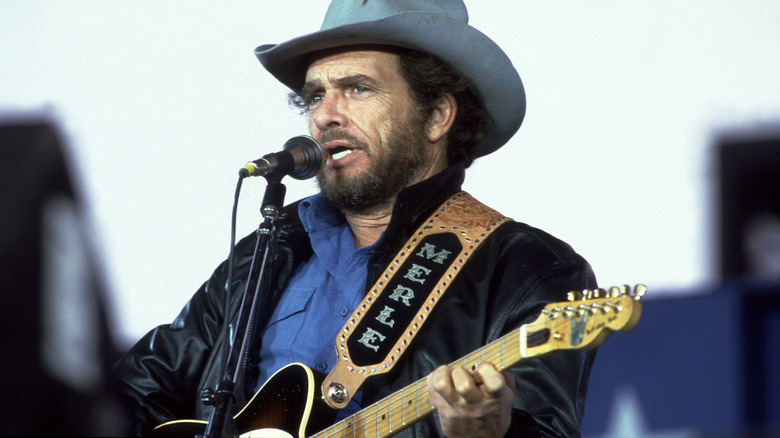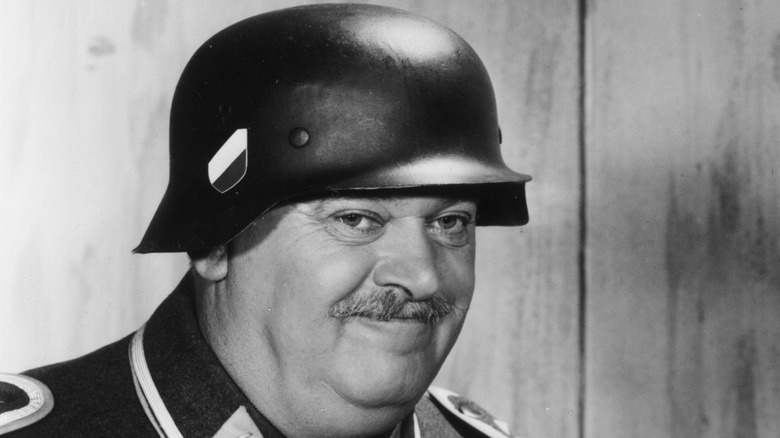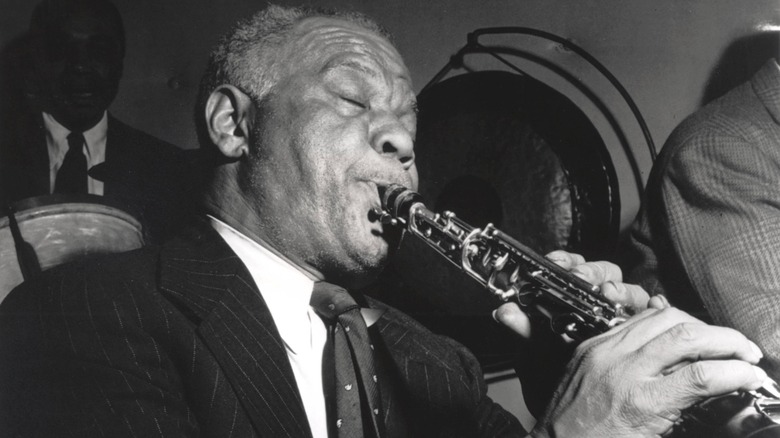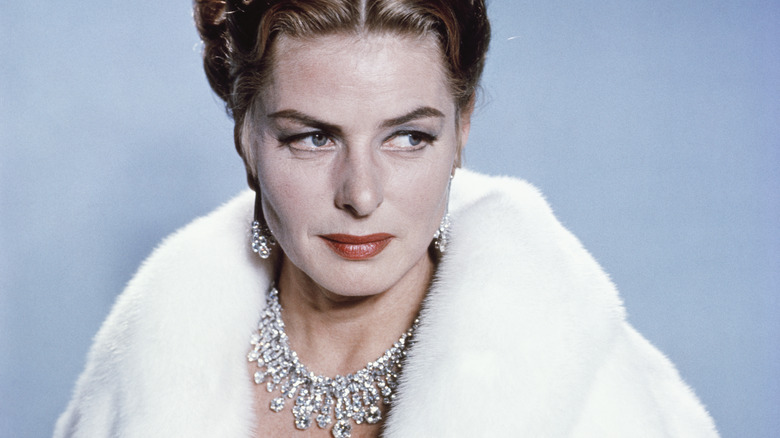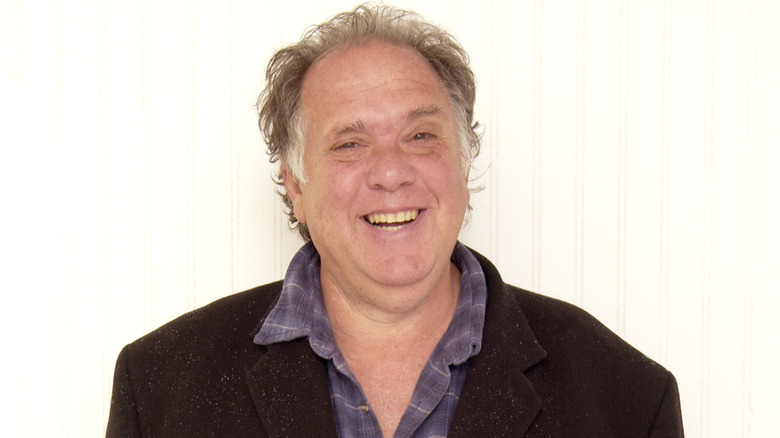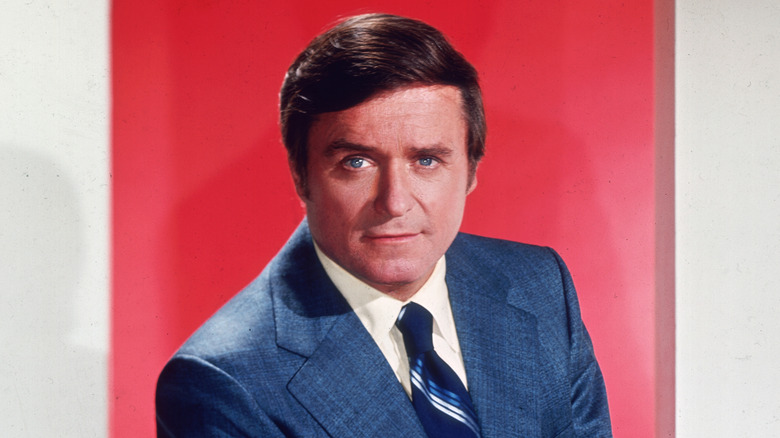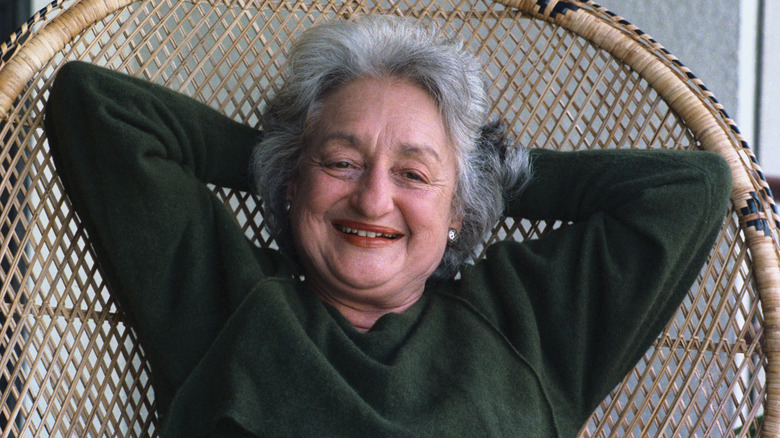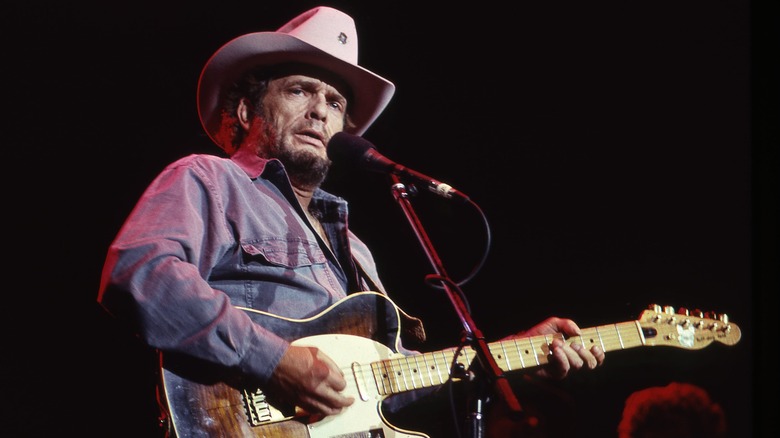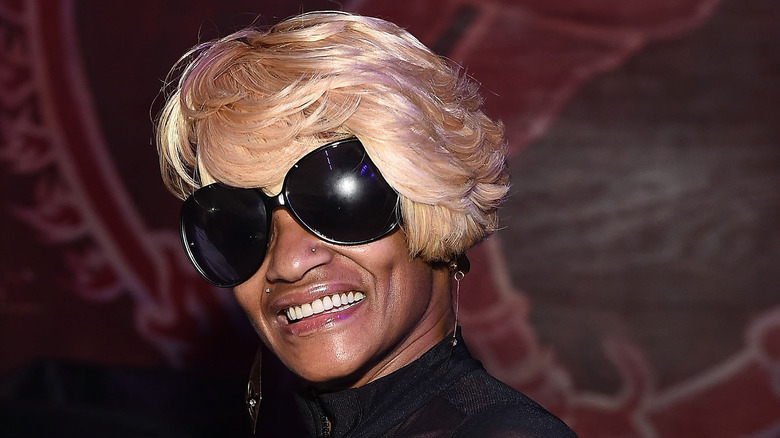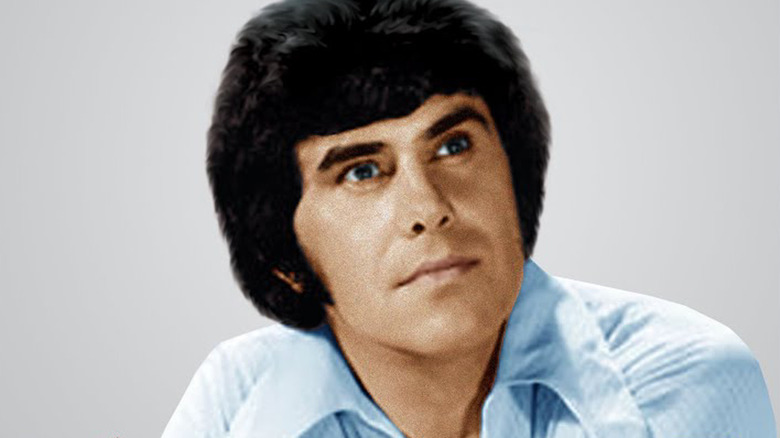Celebs Who Tragically Died On Their Birthday
It must be sobering to celebrate someone's birthday the same day that individual expires. And while the odds of meeting your maker after blowing out the ceremonial candles seem astronomical, a University of Chicago study from 2014 revealed that likelihood was far from remote. The paper determined that those aged 20-29 were most prone to experiencing more than a 25% chance of dying on their birthday, although the research hinted that excessive celebrations figured heavily into that figure. Conversely, the lowest death rate among birthday celebrants was 4.6% among seniors aged 80-89. And while celebrities are more likely to go all out on their birthdays, simply because they can afford such an extravagance, death rates on the same day as their more posh life anniversaries aren't particularly common.
The same goes for famous folks who wound up deceased before revelers could break out the party hats. That list includes "Three's Company" star Suzanne Somers, who died from cancer October 15, 2023, merely a day before she was about to turn 77. Similarly, John Ritter, her sitcom cohort, succumbed to heart failure September 11, 2003, six days shy of his 55th birthday. And comedic actor Betty White passed on December 31, 2021 from natural causes, less than three weeks before she could reach centenarian status.
Granted, the number of birthday/death day occurrences among entertainers is rather rare, but this compilation of those who went through such a timely life cycle reveals a few colorful and diverse personalities with rather eclectic backgrounds.
John Banner (1910-1973)
John Banner was best known as the bumbling Sgt. Schultz who patrolled German POW camp Stalag 13 in the WWII sitcom "Hogan's Heroes." The premise of the '60s TV series was a far cry from real-life Third Reich horrors, which suited Banner just fine. "The aim of our show is to relax people, to bring laughter," said Banner, a former wartime sergeant with the U.S. Army, in The Fresno Bee in 1967. Banner liked how "Hogan's Heroes" satirized militarism, especially with German soldiers portrayed as buffoons.
Nazism wasn't even a thing when the actor, born Johann Banner to a Jewish family in Vienna, Austria in 1910, was growing up. Attending university, he switched from law to drama and it was with a collegiate troupe touring in Switzerland in 1938 when the Germans had invaded Austria. Unable to return home, Banner fled to the U.S. and despite not knowing English, joined a theater company comprised of refugees. After the war, Banner reluctantly found himself typecast in combat flicks as German heavies, largely due to his bulky frame and thick accent. He later did guest TV appearances before landing Schultz, whom he felt deserved a heartwarming treatment. "I am a grandfather in uniform, a creampuff who waddles around hoping to be friendly," he said of his famous portrayal. "Now who can be afraid of a grandfather, or a cream puff for that matter?" Banner died from an abdominal hemorrhage in Vienna January 28, 1973. He had just turned 63.
Sidney Bechet (1897-1959)
Pundits would place jazz legend Louis Armstrong among the most important figures in the development of American music, but soprano saxophonist Sidney Bechet certainly gave "Satchmo" a run for his money. For instance, while jazz aficionados credit Armstrong as the first artist to define the notion of a jazz soloist, others point out that Bechet beat the famed trumpeter months earlier courtesy of numerous studio sessions. Competition among titans notwithstanding, Bechet is still recognized for the vibrato accenting his bold delivery, particularly evident in his piece, "Si Tu Vois Ma Mere," used in the opening for the 2011 Woody Allen movie "Midnight In Paris."
Born in New Orleans in 1897, Bechet was exposed to music early in life, becoming a prodigy at 13 and a touring musician three years later. By the time he hit his 20s, he found steady work in Europe, particularly in France where he was idolized as a musical giant. He also had a fierce temper, which landed him in trouble, including jail time for accidentally shooting a woman during a duel where 3 bystanders were wounded. "Oh, I know I can be mean, I know that," he once remarked, per NPS. "But not to the music." Bechet never became a household name in the U.S., but his style became a profound influence on more famous jazz saxophonists who followed him, including John Coltrane, Wayne Shorter, and Branford Marsalis. Bechet died of lung cancer in his adopted country of France, on May 14, 1959. He had just turned 62.
Ingrid Bergman (1915-1982)
Ingrid Bergman won three Academy Awards during her career, but wasn't even nominated for her best-known role as Ilsa Lund in the classic drama "Casablanca." While fans might have been upset over the snub, Bergman confessed she and co-star Humphrey Bogart weren't crazy about the movie during filming. "We never knew what we were doing from one day to the other," recalled Bergman on "The Dick Cavett Show" in 1978. "So it seems very strange that, that picture of all pictures that were much better organized and written... that one, with all the confusion and script written day by day, and Humphrey Bogart was very bad humor because he never knew what he was going to do next... that one became a classic."
Born in 1915 in Stockholm, Bergman started acting while briefly attending the Royal Dramatic Theater School and quickly became a screen idol in her native Sweden. Her film, "Intermezzo," caught the attention of Hollywood mogul David O. Selznick, who cast her in several movies until her 1942 breakthrough with "Casablanca." Three years later, she scored her first Oscar with "Gaslight," and enjoyed a lucrative movie career until she was blacklisted in 1950 for an affair with Italian director Roberto Rossellini, which produced a child. Eventually she bounced back winning two more Oscars for her portrayals in the 1956 biopic "Anastasia" and the 1974 whodunit "Murder on the Orient Express."
Bergman died of cancer in London August 29, 1982. She had just turned 67.
Maury Chaykin (1949-2010)
You might not recognize Maury Chaykin by name, but you might have remembered his doughy visage, which he used to great effect. He startled audiences as a suicidal Cavalry officer in "Dances With Wolves," received guffaws as a grit-eating witness in "My Cousin Vinny," and might have even upset morally corrupt producer Harvey Weinstein courtesy of his satirical send-up in the HBO series "Entourage." "I have never worked for Harvey Weinstein," Chaykin mused in the Toronto Star in 2007, per L.A. Weekly. "And now I think maybe I never will." Save for his portrayal of an agoraphobic novelist in A&E's gumshoe series "Nero Wolfe," Chaykin was otherwise a briefly familiar face on U.S. screens.
In Canada, it was a much different story, where Brooklyn native Chaykin not only found steady acting gigs, but received an armful of awards for his work. He was a regular on domestic prime-time fodder that included "Due South" and "Street Legal" and even landed a role on the Oscar-nominated 1997 Canadian tragic drama "The Sweet Hereafter." It's that kind of success that prompted Chaykin to avoid the temptation to reside in Hollywood. "I never found it terribly attractive to live in Los Angeles full-time and have the business ... overtake my life," he said on "Q" "And it's very difficult to resist that when you're in the kind of in the middle of it." Chaykin died from a heart valve infection in a Toronto hospital July 27, 2010. He had just turned 61.
Mike Douglas (1925-2006)
One long-standing tradition that still holds true among daytime and late-night talk shows is that their hosts cut their teeth on the standup comedy circuit. Mike Douglas was a rare exception to that pattern in that he was previously a singer before making the transition to the chat-TV format. Douglas started as a vocalizer for big bands doing popular hit parade numbers in his native Chicago late in the 1940s, before trying his hand at hosting a local TV talk show. It turned out that his gift of gab was as good as his flair for singing, leading to an invitation by the Westinghouse Broadcasting Company to relocate the program to Cleveland in 1961. There, Mike Douglas established his show, named after him, which was syndicated across other Westinghouse studios and would eventually be shown nationally. After later moving to Philidelphia in 1965, "The Mike Douglas Show" won an Emmy in 1967, becoming the second ever daytime program to win an Emmy (and the first to win in the newly named category). The show remained in Philly for most of its 20 seasons on the air, before it moved once again in 1978 to Burbank where it was axed in 1981.
Douglas once related two tips that helped him during those years as a talk show host. "The main thing is to listen," he said to Rosie O'Donnell, back when she was hosting her own daytime program. "The other thing is to try, always to make your guest look better than he actually is. And that works."
Douglas died of causes unknown in Florida August 11, 2006. He had just turned 81.
Betty Friedan (1921-2006)
If not for activist and journalist Betty Friedan, feminism wouldn't likely have had the clout it initially wielded in the '60s and morphed into a prominent movement. Her book, "The Feminine Mystique," published in 1963, addressed women unhappy with being lower-tiered housewives and lay the groundwork for a battle to achieve gender parity. "The problem lay buried, unspoken, for many years in the minds of American women," she wrote in the book's opening passage, per Smithsonian Institute. "It was a strange stirring, a sense of dissatisfaction, a yearning that women suffered in the middle of the twentieth century in the United States."
Realizing that she had to do more than write about the still-nascent idea of feminism, the Illinois native and divorced mother of three went even further by cofounding the National Organization for Women in 1966, and later on, more issue-specific agencies in support of abortion rights and equal gender pay. "Well, there was no activism in that cause when I wrote 'The Feminine Mystique,'" she said on PBS. "But I realized that it was not enough just to write a book. There had to be social change." But more latter-day feminists found her ideas to be rather old-school and criticized Friedan for being soft on supporting lesbian rights, something she admitted was "very square" on her part. Still, "The Feminine Mystique" remains a cornerstone that helped empower women. Friedan died of congestive heart failure in Washington, D.C. February 4, 2006. She had just turned 85.
Merle Haggard (1937-2016)
While country singers have long been preoccupied with romanticizing the honkytonk hellraising reputation of their ilk, performer Merle Haggard actually lived through those experiences while churning out hits like "Hungry Eyes" and "I Think I'll Just Stay Here and Drink." When he wasn't penning tunes about his excesses, he would shift his focus towards disenfranchised, blue-collar folks on classics like "Workin' Man Blues," one of 38 chart-topping singles he enjoyed throughout his career. For someone whose material dealt with the dustier foundations of American life, Haggard oddly enough reflected an abstract philosophy about his genre of choice. "Country music is about those things that we believe in but we can't see –like dreams, and songs, and souls," he said in the Ken Burns produced PBS documentary series "Country Music." "They're hanging around here and different songwriters reach up and get them."
The California native's life easily provided material for Haggard hits. His family, who were from Oklahoma, endured the aftershocks of the Great Depression, a plight made worse when his father, a railroad carpenter, died when Haggard was still just a kid. Working odd jobs, Haggard got into trouble a lot, even doing jail time in San Quentin. He found solace in Bakersfield, California where he launched a music career that eventually yielded a distinction in the Country Music Hall of Fame, three Grammys, six Country Music Association trophies and more than 20 Academy of Country Music Awards honors. Haggard died from pneumonia in California April 6, 2016. He had just turned 79.
Frankie Lons (1960-2021)
R&B singer Keyshia Cole reached musical validation via hits that include "Love" and "Heaven Sent," the latter earning two Grammy nominations in 2009. But the songstress also endured a notoriety she could have done without, namely being the offspring of her hard-partying mother Frankie Lons, who tasted a few servings of fame herself. Lons first became known to audiences when she appeared with her daughter on cable channel BET's reality series "Keyshia Cole: My New Life" in 2006. While the series captured several moments of bonding between the two, the topic of Lons' addiction continued to crop up. But BET found Lons to be so animated and flamboyant, they opted to feature her in a spinoff of the Cole series. The show, "Frankie and Neffe," which showcased Lons–this time with her daughter Neffeteria Pugh–debuted in 2009 and lasted two seasons.
It was while the show was winding down that substance dependency began to take its toll on Lons. "I was tired of people looking at me," she said in the Atlanta Journal-Constitution. "I was drinking until I blacked out." In 2010, she checked into a rehabilitation facility run by celebrity addictions specialist Dr. Drew Pinsky, who also hosted VH-1's "Celebrity Rehab with Dr. Drew." During her recovery, Lons guested on the show with celebs that included model Janice Dickenson and actor Eric Roberts. Sadly, what she absorbed during rehab didn't take hold. Lons died from drug intoxication in Oakland July 18, 2021. She had just turned 61.
William Shakespeare (1564-1616)
Scripts these days owe a quilled pen or two to playwright William Shakespeare, creator of such classics as "Hamlet," "MacBeth" and "The Tempest." A-list actors from Patrick Stewart to James Earl Jones probably wouldn't garner as much respect without Shakespearean backgrounds. The man dubbed The Bard revolutionized English by introducing clever turns of phrase still commonly used today, from "wild goose chase" ("Romeo and Juliet") to "it's Greek to me" ("Julius Caesar"). "Our language is built by Shakespeare," said Dominic Dromgoole, a creative director of Shakespearean troupe Globe To Globe, said to CBS News in 2016, 400 years after the writer's death. "Thousands of words he made up, thousands of phrases, thousands of ways of thinking, which is what language and phrases are."
While Shakespeare's legacy is still prominent, influencing popular movies like "The Lion King," "West Side Story," and "10 Things I Hate About You," little is known about the man himself. He was one of eight children born to leather salesman John Shakespeare and land heiress Mary Arden. He married Anne Hathaway, and had three children. But pundits aren't sure about his education that led to his literary and theatrical direction. Besides his work, what stands out was his famed facility, The Globe Theatre, which showcased much of his work, and that Queen Elizabeth I was a loyal fan. Although some scholars still harbor doubts about the date, William Shakespeare died of causes unknown in Stratford, England April 23, 1616. He had just turned 52.
Mel Street (1933-1978)
Mel Street wouldn't likely have thought much about the urban country and new country movements that percolated on airplay charts as early as the '80s. His brand was closer to classic tear-in-your-beer fodder, complete with weeping pedal steel, that the likes of Hank Williams, Webb Pierce, and George Jones–Street's idol–helped to make famous. Like the twang stars he admired, the native Virginian, the son of a coal miner, built his following from the ground up, starting with his debut on regional radio at 16 to playing live at clubs in places where he found work as an electrician, mechanic, and other odd jobs.
He also had a knack for writing tunes on the spot, such as his hit single, "The Town Where You Live," which he claimed to have penned at a truck stop outside Memphis. "I was going west," recalled Street in 1973 on St. Louis radio station WIL AM/FM. "I was going to do a show out there and uh these two truck drivers were sitting side by side and they started talking and I got the idea from what they were saying to write that song." Street had 20 hit singles throughout his career, including his 1970 debut "Borrowed Angel," which would turn out to be his signature tune. But dealing with that success took its toll, as the performer often suffered from depression, seeking refuge with a bottle. Street fatally shot himself in Tennessee October 21, 1978. He had just turned 43.

